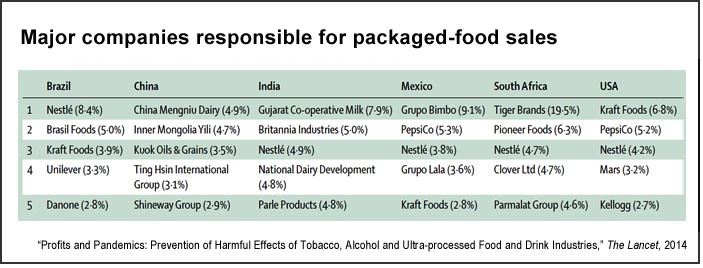Non-communicable diseases (NCDs) — conditions such as obesity-driven hypertension, or heart disease from smoking — are a major and rising cause of premature death globally. Even as developing countries decrease the incidence of tuberculosis, malaria and other ills, the disease burden often shifts to NCDs. From the impact of sugary beverages in Mexico to major shifts in the Chinese diet that are leading to poorer health outcomes, the world is witnessing substantial changes as humans shift their patterns of consumption. Among other notable and troubling indicators, the rate of obesity globally has doubled since 1980.
Some researchers state that the food companies now contributing to the rise of NCDs in low- and middle-income countries are “manufacturing epidemics.” Public health experts generally agree that a great deal of morbidity and mortality due to NCDs is attributable to transnational corporations that profit from the sale of unhealthy commodities, such as tobacco, alcohol, ultra-processed and packaged foods and sugar-sweetened beverages. Together, these products are the leading causes of death, globally. The health impacts of these and other commodities have also been termed “industrial epidemics.”
Corporations that are among the leaders in sales in various countries include many familiar in the West — for example, Nestlé, Kraft Foods and Unilever — in addition to firms focusing on national markets such as Grupo Bimbo in Mexico, China Mengniu Dairy and Gujarat Co-operative Milk in India (see table at bottom.)
A 2011 U.N. high-level meeting on NCDs called for public health engagement of the private sector as part of a comprehensive strategy for addressing NCD epidemics; a goal of reducing premature NCD-caused mortality by 25% by 2025 has been set. While the Framework Convention on Tobacco Control established guidelines that explicitly state a policy against interaction with the tobacco industry, there remains debate whether public health collaboration with the alcohol, food and beverage industries is appropriate or constructive. The extent to which the industries that manufacture products that cause disease should be involved in public health strategies to reduce their health impacts is an open question.
An influential and frequently cited 2013 study published in The Lancet, “Profits and Pandemics: Prevention of Harmful Effects of Tobacco, Alcohol, and Ultra-Processed Food and Drink Industries,” provides a comprehensive overview of this emerging field of research, reporting and policy. The paper reviews and evaluates historical strategies for addressing industrial epidemics, examining self-regulation, public-private partnerships and public regulation; it synthesizes the findings of dozens of leading studies in this field and offers policy insights. The researchers involved — Rob Moodie, David Stuckler, Carlos Monteiro, Nick Sheron, Bruce Neal, Thaksaphon Thamarangsi, Paul Lincoln and Sally Casswell — are from a wide range of research institutions internationally.
The paper’s findings include:
- Demand for ultra-processed products tends to increase as economies grow and residents are both better able to afford these products and more in need of convenience. Demand also increases with marketing.
- Economic policies contribute to consumption of alcohol and ultra-processed food and drink products. Reductions in consumption can be linked to regulation, and increases with deregulation.
- Alcohol and ultra-processed food and drink industries use the strategies pioneered by the tobacco industry to avoid regulation and prevent loss of customers by: (1) biasing research findings by creating their own and funding external research; (2) co-opting policy makers and health professionals, assisting with the creation of policy and health promotion strategies; (3) lobbying against public regulation and funding political campaigns; and (4) encouraging voters to oppose regulation by emphasizing use of their products as a personal choice, avoiding disclosure of health consequences, promoting ineffective education campaigns, and funding charitable causes unrelated to their products.
- Collaboration with industry has so far yielded few public health successes: “There is little objective evidence that public-private partnerships deliver health benefits, and many in the public health field argue that they are just a delaying tactic of the unhealthy-commodity industries.”
- There is also little evidence that self-regulation of these industries is effective in preventing disease or promoting health.
- “In view of the present and predicted scale of non-communicable disease epidemics, the only evidence-based mechanisms that can prevent harm caused by unhealthy commodity industries are public regulation and market intervention.”
Recognizing the “conflicts of interest between promotion and protection of public health and the corporations that profit from unhealthy commodities,” the authors suggest avoiding any collaboration with commodity industries in forming guidelines and strategies for regulation and health promotion. The study also highlights some of the packaged food companies involved (the following table has been adapted from the original):
Related research: Other papers with in-depth analysis on this topic include: A 2012 study in PLoS One, “Manufacturing Epidemics: The Role of Global Producers in Increased Consumption of Unhealthy Commodities Including Processed Foods, Alcohol, and Tobacco”; a 2013 study in Public Health Nutrition, “Nutritional Determinants of Worldwide Diabetes: An Econometric Study of Food Markets and Diabetes Prevalence in 173 countries”; and a 2011 study in Globalization and Health, “Major Multinational Food and Beverage Companies and Informal Sector Contributions to Global Food Consumption: Implications for Nutrition Policy.”
Keywords: tobacco, alcohol, processed food, sugar sweetened beverages, big food, health, regulation, public-private partnerships, industrial epidemics, health promotion, non-communicable diseases



Expert Commentary